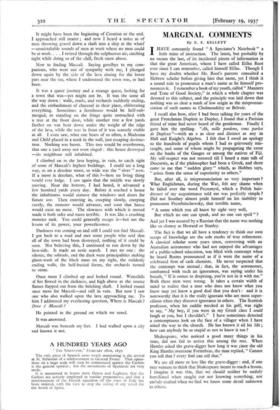MARGINAL COMMENTS
By E. E. KELLETT
I recall also how, after I had been talking for years of the great Frenchman Dupleix as Duplay, I found that a Parisian friend of mine had never heard of the gentleman. Finally I gave him the spelling. "Ah, milk pardons, your parlex. de Duplexx"—with an x as clear and distinct as any in Hall and Knight's Algebra. I felt that I owed an apology to the hundreds of pupils whom I had so grievously mis- taught, and some of whom might be propagating the error on the banks of the Ganges or among the natives of Fiji. My self-respect was not restored till I heard a man talk of Descartes, as if the philosopher had been a Greek, and there came to me that "sudden glory" which, as Hobbes says, "arises from the sense of superiority to others."
But, after all, is mispronunciation so very important ? What Englishman, during the War, felt any shame when he failed over the word Prezemysl, which a Polish hair- dresser of my acquaintance told me was perfectly simple ? Did not Southey almost pride himself on his inability to pronounce Prczebitschewsky, that terrible name, "A name which you all know by sight very well, But which no one can speak, and no one can spell " ?
And yet I was assured by a Russian that the name was nothing like so clumsy as Howard or Stanley.
The fact is that we all have a tendency to think our own scraps of knowledge are the sole marks of true refinement. A classical scholar some years since, conversing with an Australian astronomer who had not enjoyed the advantages of a public-school education, was filled with contempt when he heard Bootes pronounced as if it were the name of a celebrated firm of cash chemists. He never suspected that the contempt was mutual ; that, in fact, the astronomer, confronted with such an ignoramus, was saying under his breath, "If it comes to despising, you're not in it with me." Both these men were wrong. It takes a certain width of mind to realise that a man who does not know what you know may yet know a good deal that you don't : and it is noteworthy that it is the really ignorant who are most super- cilious when they discover ignorance in others. The Scottish professor, when his caddie mocked at his golf, was right to say, "My boy, if you were in my Greek class I could laugh at you, but I shouldn't." I have sometimes detected a contemptuous look on the face of a villager when I have asked the way to the church. He has known it all his life ; how can anybody be so stupid as not to know it too ?
Shakespeare, who noticed a good many things in his time, did not fail to notice this among the rest. When Hamlet asked the grave-digger how long it was ;ince the old King Hamlet overcame Fortinbras, the man replied, " Cannot you tell that ? every fool can tell that."
We are all more or less like the grave-digger : and, if one may venture to think that Shakespeare meant to teach a lesson, I imagine it was this, that we should neither be unduly humiliated when caught out not knowing something, nor unduly exalted when we find we know some detail unknown to others.














































 Previous page
Previous page